Top Rankings
Connecting Waters Charter - East Bay School District ranks among the top 20% of public school district in California for:
Category
Attribute
Overall Rank
Highest overall rank (Top 10%)
Math Proficiency
Highest math proficiency (Top 10%)
Reading/Language Arts Proficiency
Highest reading/language arts proficiency (Top 10%)
Science Proficiency
Highest science proficiency (Top 5%)
Diversity
Most diverse schools (Top 1%)
Student Attention
Lowest student:teacher ratio (Top 1%)
For the 2025 school year, there is 1 public school serving 505 students in Connecting Waters Charter - East Bay School District. This district's average testing ranking is 10/10, which is in the top 10% of public schools in California.
Public School in Connecting Waters Charter - East Bay School District have an average math proficiency score of 59% (versus the California public school average of 33%), and reading proficiency score of 74% (versus the 47% statewide average).
Minority enrollment is 76% of the student body (majority Asian), which is less than the California public school average of 80% (majority Hispanic).
Overview
This School District
This State (CA)
# Schools
1 School
10,369 Schools
# Students
505 Students
5,826,838 Students
# Teachers
30 Teachers
268,012 Teachers
Student : Teacher Ratio
17:1
17:1
District Rank
Connecting Waters Charter - East Bay School District, which is ranked #110 of all 1,925 school districts in California (based off of combined math and reading proficiency testing data) for the 2021-2022 school year.
The school district's graduation rate of 80% has stayed relatively flat over five school years.
Overall District Rank
#110 out of 1941 school districts
(Top 10%)
(Top 10%)
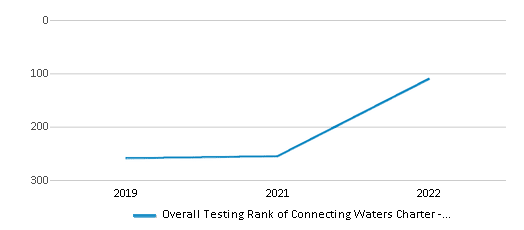
Math Test Scores (% Proficient)
59%
33%
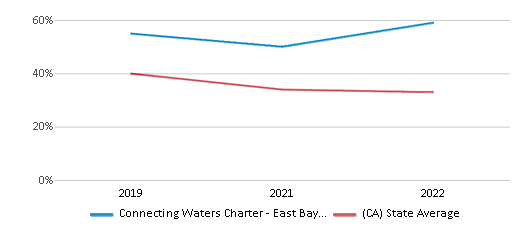
Reading/Language Arts Test Scores (% Proficient)
74%
47%
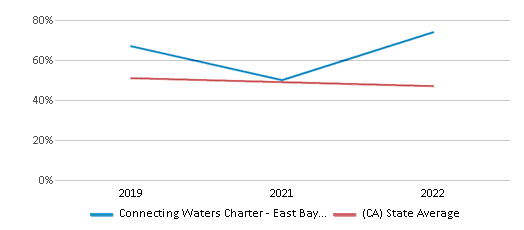
Science Test Scores (% Proficient)
60-64%
29%
Graduation Rate
≥80%
87%
Students by Ethnicity:
Diversity Score
0.73
0.63
# American Indian Students
4 Students
25,796 Students
% American Indian Students
1%
1%
# Asian Students
212 Students
705,807 Students
% Asian Students
42%
12%
# Hispanic Students
67 Students
3,264,561 Students
% Hispanic Students
13%
56%
# Black Students
14 Students
286,112 Students
% Black Students
3%
5%
# White Students
119 Students
1,178,558 Students
% White Students
24%
20%
# Hawaiian Students
1 Student
23,731 Students
% Hawaiian Students
n/a
n/a
# Two or more races Students
87 Students
333,755 Students
% of Two or more races Students
17%
6%
Students by Grade:
# Students in PK Grade:
-
83
# Students in K Grade:
28
522,456
# Students in 1st Grade:
39
396,605
# Students in 2nd Grade:
35
414,466
# Students in 3rd Grade:
43
416,628
# Students in 4th Grade:
36
426,361
# Students in 5th Grade:
42
430,587
# Students in 6th Grade:
44
432,997
# Students in 7th Grade:
36
439,621
# Students in 8th Grade:
39
441,777
# Students in 9th Grade:
55
466,534
# Students in 10th Grade:
42
476,585
# Students in 11th Grade:
43
469,511
# Students in 12th Grade:
23
492,627
# Ungraded Students:
-
-
District Revenue and Spending
The revenue/student of $8,661 in this school district is less than the state median of $19,974. The school district revenue/student has grown by 5% over four school years.
The school district's spending/student of $7,796 is less than the state median of $18,396. The school district spending/student has grown by 5% over four school years.
Total Revenue
$4 MM
$116,387 MM
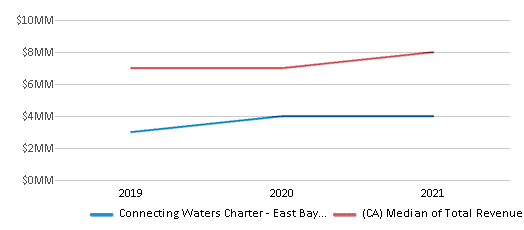
Spending
$4 MM
$107,188 MM
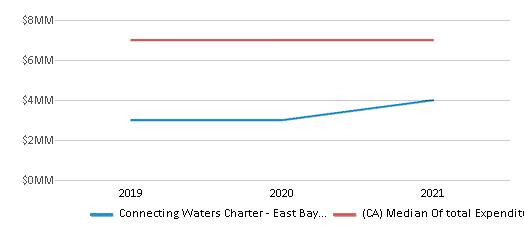
Revenue / Student
$8,661
$19,974
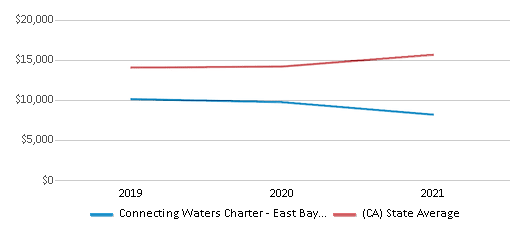
Spending / Student
$7,796
$18,396
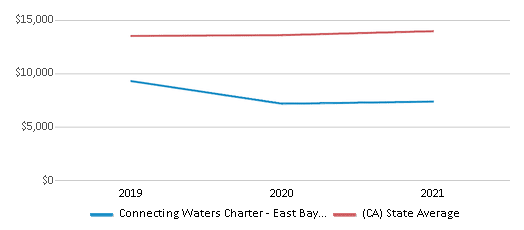
Best Connecting Waters Charter - East Bay School District Public Schools (2025)
School
(Math and Reading Proficiency)
(Math and Reading Proficiency)
Location
Grades
Students
Rank: #11.
Connecting Waters Charter - East Bay
Charter School
(Math: 59% | Reading: 74%)
Rank:
Rank:
9/
Top 20%10
703 C St.
Waterford, CA 95386
(209) 874-1119
Waterford, CA 95386
(209) 874-1119
Grades: K-12
| 505 students
Frequently Asked Questions
How many schools belong to Connecting Waters Charter - East Bay School District?
Connecting Waters Charter - East Bay School District manages 1 public schools serving 505 students.
What is the rank of Connecting Waters Charter - East Bay School District?
Connecting Waters Charter - East Bay School District is ranked #110 out of 1,925 school districts in California (top 10%) based off of combined math and reading proficiency testing data for the 2021-2022 school year. This district ranks in the top 20% of California school districts for: Highest overall rank (Top 10%), Highest math proficiency (Top 10%), Highest reading/language arts proficiency (Top 10%), Highest science proficiency (Top 5%), Most diverse schools (Top 1%) and Lowest student:teacher ratio (Top 1%)
What is the racial composition of students in Connecting Waters Charter - East Bay School District?
42% of Connecting Waters Charter - East Bay School District students are Asian, 24% of students are White, 17% of students are Two or more races, 13% of students are Hispanic, 3% of students are Black, and 1% of students are American Indian.
What is the student/teacher ratio of Connecting Waters Charter - East Bay School District?
Connecting Waters Charter - East Bay School District has a student/teacher ratio of 17:1, which is lower than the California state average of 22:1.
What is Connecting Waters Charter - East Bay School District's spending/student ratio?
The school district's spending/student of $7,796 is less than the state median of $18,396. The school district spending/student has grown by 5% over four school years.
Recent Articles

Sexual Harassment at Age 6: The Tale of a First Grade Suspension
A six-year old in Aurora, Colorado, was suspended after singing an LMFAO song to a little girl in his class and reportedly “shaking his booty.” We look at the case and the sexual harassment problem in public schools today.

How Scaffolding Could Change the Way Your Child Learns
This article explores the concept of instructional scaffolding, a teaching method that enhances learning by breaking down complex tasks into manageable parts. It highlights how scaffolding supports students in developing critical thinking skills and becoming more independent learners. The article discusses the benefits of scaffolding, including improved engagement and reduced anxiety, and provides strategies for its implementation across various educational levels.

February 05, 2025
Understanding the U.S. Department of Education: Structure, Impact, and EvolutionWe explore how the Department of Education shapes American education, from its cabinet-level leadership to its impact on millions of students, written for general audiences seeking clarity on this vital institution.





